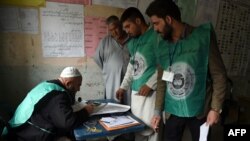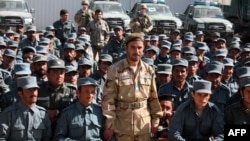Saturday’s parliamentary election in the southern Afghan province of Kandahar will be delayed a week after the assassination of one of the country’s most powerful security chiefs dealt a stunning blow to the Western-backed government.
General Abdul Raziq, the Kandahar police commander, was killed outside the provincial governor’s office Thursday, when a bodyguard opened fire on a group of officials as they left a meeting with General Scott Miller, the commander of U.S. and NATO forces in Afghanistan.
Miller was not injured but the regional intelligence agency commander was killed and the provincial governor severely wounded, decimating the leadership of one of the country’s most strategically important provinces.
Although nominally a provincial police chief, Raziq was one of the most powerful political figures in Afghanistan and a formidable opponent of the Taliban, with unchallenged authority across the volatile south of the country.
The decision to suspend the vote in Kandahar province was taken over the objections of some officials who warned that any delay would threaten the whole process and hand the Taliban a major propaganda victory.
Saturday’s election had been seen as a major test of the government’s credibility and ability to organize a nationwide ballot ahead of the more important presidential election next April.
But the shock of Raziq’s death meant the people of Kandahar were “morally not ready to vote,” Hafizullah Hashimi, spokesman of the Independent Election Commission, said.
The Taliban issued a fresh warning not to take part in the election Friday, telling people to stay at home and saying it would shut down roads and would be “closely monitoring all developments.”
The United Nations Assistance Mission in Afghanistan (UNAMA) issued a statement of its own expressing concern at Taliban statements pledging attacks on schools and other buildings used as polling centers.
“UNAMA urges the Taliban to respect and protect civilians and not to threaten them or carry out violence should they engage in their constitutional right to participate in elections,” it said.
On top of the mounting security concerns, the elections were already dogged by serious technical and organizational problems, notably around the use of untested biometric voter verification equipment rushed in after allegations of widespread voter fraud.
U.S. Defense Secretary Jim Mattis said it was too soon to say what effect Raziq’s death would have but added that the U.S. military’s mission was unaltered.
“We need to find who’s done this,” Mattis told reporters travelling with him in the southeast Asian city-state of Singapore. “But right now, we are going toward the election and we will continue to defend the Afghan people.”
It was unclear how the attack would affect moves towards a peace process, following a meeting last week of Taliban officials and the U.S. special envoy, Zalmay Khalilzad, but it complicates an already difficult situation.
“You’re going to start asking questions about, ‘Well, how trustworthy are they? What influence do they really have?’“ said one former Defense Department official who left the Pentagon recently, referring to the Taliban.
Mattis was cautious about whether the Thursday attack could hit voter turnout but said the U.S. aim of finding a negotiated, Afghan-led political solution to the conflict was unchanged.
“We remain absolutely committed to an Afghan-led Afghan reconciliation,” he said.













